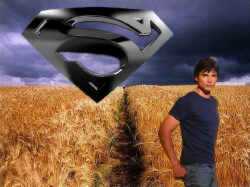 I saw 4 seasons of Smallville on DVD, in recent months, and have just watched the 5th season boxset. Apart from the boredom of overdone teen-romance subplots (was Buffy ever this sappy?), I think it’s a great show with plenty of interesting variations on the comics’ mythology, a bunch of worthwhile supporting characters (ace-reporter Chloe is entirely original to this series) and some intriguing, still on-going, plot developments.
I saw 4 seasons of Smallville on DVD, in recent months, and have just watched the 5th season boxset. Apart from the boredom of overdone teen-romance subplots (was Buffy ever this sappy?), I think it’s a great show with plenty of interesting variations on the comics’ mythology, a bunch of worthwhile supporting characters (ace-reporter Chloe is entirely original to this series) and some intriguing, still on-going, plot developments.Although this show amounts to nothing less - or more - than a chronicle of the early days of ‘the last son of Krypton’, somewhat cynically reinterpreted for the post-X-Files generation, perhaps the strongest genre TV influence on Smallville is actually the short-lived Eerie, Indiana. Like that show’s tiny community, Smallville is presented as the locus of weird Americana, a rural area where the economy gets a welcome boost from corporate investment (although the Luthors’ presence in town, and interest in its residents, is rarely benevolent) in the wake of a strange meteor shower.
And in Smallville, it’s the space rocks that are wholly different. Unlike the scenario in DC’s Superman comics, where Kryptonite is normally quite inert, with little or no adverse effect on humans, the creators of Smallville decided to make 'K' stuff (including red and silver types) the cause of numerous bizarre mutations and curious super-empowering effects. So, green signifies fear, and red means danger, as never before. It’s also fun to see how the millennial Smallville appropriates industrial espionage clichés and noir thriller frissons. Typically, a sympathetic supporting character is stopped in the street, he - or she - gets into a big black limo, the mysterious car drives away into the darkness of night… and there’s yet another cliff-hanger ending to keep you guessing, until next week.
“Do you know why there are no heroes, today? It’s because we have no respect for them. Instead, we envy them, and can’t wait for them to screw up.”
Of course, as the young Clark Kent, 25-year-old actor Tom Welling is perfectly cast. He plays inner conflict, moral anguish and outrage, and awkwardness with rare skill. He is to Superboy, what Christopher Reeve was to the popular icon of Superman (in Richard Donner’s 1978 film). The makers of Smallville also won several other casting coups, starting with Annette O'Toole (who played Lana Lang, opposite Reeve, in the overly comedic Superman III, 1983) as Martha Kent, and John Schneider (still most famous for The Dukes Of Hazzard, 1979-85) as Jonathan, Clark’s adoptive parents.
Veteran of stage and screen, John Glover (who played the Devil in Brimstone, 1998-9) brings plenty of gravitas and good humour, as required, to his seemingly pivotal role as billionaire Lionel Luthor, scheming father of bitter and twisted Lex (Michael Rosenbaum). Christopher Reeve and Margot Kidder also make brief appearances in Smallville, cementing its relevant and irreverent links to Reeve’s cinema Superman, more certainly than Smallville TV’s fleeting usage of John Williams’ memorable big screen score.
If there’s a serious flaw in the production of Smallville, it’s undoubtedly Kristin Kreuk as self-centred cheerleader, the simpering Lana. A pretty but often vacuous character, Clark’s high school sweetheart Lana is clearly supposed to be the key to farm-boy Clark’s ‘human’ heart, but big-eyed Kreuk’s puppy love routine soon becomes very tiresome. Smallville takes far too long before Clark grows out of his teenage crush on Lana, and he only graduates from high school after 4 whole seasons of TV (I’m sure that Buffy left school in just 3 seasons). The appearance of Lois Lane (a spiky, uncompromising role for Erica Durance) in season 4 marks a welcome change of pace for Smallville as TV drama. She’s worthy of all the hype, shaking up the basic prone-to-formula scenario of a superhero-in-training, and knocking the straw from Clark’s head (of course, each time Lois gives him a friendly punch on the shoulder, it’s actually another test of our young superhero’s learned ‘human’ vulnerabilities, a blow to his psyche), just in time for the emotional problems of his transformative experiences when confronted by his mind-boggling extraterrestrial heritage, and inevitable ascension to, and trials of, his compassionate godhood as Kal-El.
The finale of season 5 sees nearly all the main characters in one sort of predicament or danger, with moral questions and threats to mortality capping dramatic scenes with potentially terrible consequences. This amounts to a spike of so many nagging questions that Smallville fans will be left rabid for more.

No comments:
Post a Comment